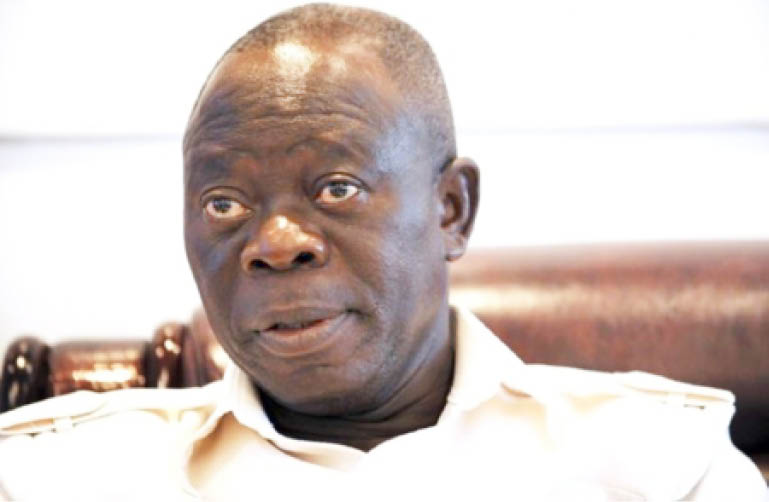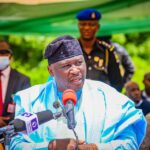The dramatic intervention last week by the National Assembly in the festering crisis of meltdown of democracy in Edo State, and which has claimed the Edo State House of Assembly (EDHA) as its epicenter, constitutes the writing of a new chapter in the political history of Nigeria. For some weeks now the EDHA has been embroiled in a power tussle over control of its soul – a contest which is largely believed to be a proxy war between interests that represent the incumbent governor of the state Godwin Obaseki and the National Chairman of the ruling APC as well as the immediate past governor of the state Adams Oshiomhole. Out of a total of 24 members, 11 are purportedly loyal to Obaseki while the remaining 13 are believed to stand for Oshiomole. So protracted is the tussle that almost one full month after the statutory proclamation by the governor for the house to be inaugurated, events have taken a turn for the worse, leaving the institution a theatre of the absurd instead of the temple of democracy it was intended to be. Specifically, the 24-member house had nine of them sworn in on June 17th 2019, who proceeded to elect as Speaker Frank Okiye, while two additional ones two days later joined them. The remaining 13 members have been floating in political limbo since then.
On Wednesday last week the House of Representatives in plenary adopted the report of a Special Committee set up by the Speaker Femi Gbajabiamila to investigate the matter and report back to the House. Adopting the recommendations of the Committee as presented by its Chairman Abdulrazak Namdas, the House issued several directives. Firstly, the Governor should re-issue the proclamation to inaugurate the EDHA again pursuant to a proper inauguration, ostensibly to allow for the entire members to be inaugurated at the same time. Secondly, the Inspector General of Police (IGP) and the Director-General of the Department of State Security Services (DG-DSS) should with immediate effect, seal up the EDHA premises and secure the place. Failure of these measures to resolve the situation, the National Assembly will have no other option than to take over the functions of the EDHA until a time when the former considers the situation conducive for return to status quo.
In the context of parliamentary practice, hardly can any situation be more drastic than the foregoing in the face of imminence of a meltdown of democracy in the state. Yet the EDHA is after all a pawn in a political power play, which originated outside its precincts and is at best a classic instance in which the political class has conscripted it for the purpose. It is an open secret that following the soured relationship between Oshiomhole and Obaseki, the former had been ill-disposed to supporting the governor and is seen as extending his displeasure to frustrating the later’s aspiration to seek a second term in office, in respect of which polls are due later in the year.
The crisis in the EDHA is therefore only another face of the fight between these two hitherto political bedmates now turned adversaries. And that is the raw nerve that has heightened public concern over the matter. Put succinctly, it is the degeneration of the crisis from elsewhere into the hallowed precincts of the EDHA that has induced the National Assembly to intervene and adopt drastic measures to resolve the matter. The more disturbing element in it is that it was Oshiomhole that facilitated the ascendancy of Obaseki to the exalted seat of governor of Edo State. Besides, both of them had worked closely during the days of Oshiomhole as governor when Obaseki served as the Chairman of the former’s Economic Council. The question on many lips is whether Oshiomhole has also succumbed to the bug of ex-governors fighting to pocket their erstwhile protégés and immediate successors, and try to destroy the later when such prove unyielding?
However, with several glitches along the course of the matter, the expectation over the utility of the intervention by the House of Representative remains doubtful. Firstly among such glitches is that the request by the House of Representatives for a fresh inauguration proclamation by the governor, is largely seen as illegal as the first one of June 17th 2019, constitutes and captures the only role the governor should play in the drama. Secondly, the order by the House of Representatives to the Edo State governor did not enjoy any concurrence of the Senate, which makes it a one-legged resolution, and therefore a constitutional illegality. Except where specifically stated resolutions of the National Assembly enjoy legitimacy only when they enjoy the corresponding participation of the two chambers of the institution. Thirdly, the Edo State government has cited a subsisting court ruling barring security agencies from interfering with the normal operations of the EDHA. Hence, the security agencies can only operate there if there is an instance or threat of breakdown of law and order.
It is against the backdrop of the fore going that the APC hierarchy remains the most suitably disposed authority to intervene and resolve the matter. The party leadership should put its foot down and save its interests in Edo State, even if it is for the purpose of shoring up its fortunes with respect to the upcoming governorship polls. Both Obaseki and Oshiomhole are critical stakeholders in the fortunes of the APC and should be amenable to yielding personal interests for the bigger goals of the party. Most significantly, this is also where – by virtue of his position as the Chairman of the party, Oshiomole should blink first and allow the governor Godwin Obaseki room to operate.
As the sages have said, “discretion is the better side of valour”. Needless therefore to emphasise that the bigger onus for resolving the matter, lies with Oshiomhole, as he will be ultimately culpable, in the circumstance of any untoward fallout from this crisis for the APC.

 Join Daily Trust WhatsApp Community For Quick Access To News and Happenings Around You.
Join Daily Trust WhatsApp Community For Quick Access To News and Happenings Around You.


